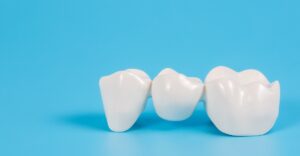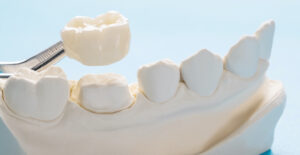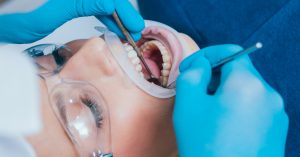
What are dental crowns?
A dental crown is like a permanent prosthetic tooth. It fits an existing tooth to cover an exposed tooth that has been treated for tooth decay or to hold a bridge in place that fills a gap between your teeth. Dental crowns protect weak teeth and also support large fillings.
A dental crown is essential to restore a damaged tooth. It helps maintain the normal shape, function, and size of the tooth. When your dentist recommends that you need a dental crown to save your tooth, it is essential to follow through with the treatment before the tooth’s integrity is further compromised.
Among other things, it is natural to be concerned about the lifespan of a dental crown because it is greatly affected by the wear and tear it endures in your mouth. The lifespan of a crown varies from patient to patient.
How long do dental crowns last?
On average, dental crowns last between five and 15 years. However, a crown’s longevity depends on the amount of “wear and tear” you expose them to. Your oral hygiene practices and personal mouth-related habits like Grinding or clenching your teeth, chewing ice, biting your fingernails, or using your teeth as a tool (For example, cutting a thread or opening packaging).
What factors affect the lifespan of a dental crown?
Several factors influence the lifespan of a dental crown. Some of these factors are:
- Your oral habits – if you have a habit of grinding or clenching your teeth or you keep crunching down on the ice and other hard items like hard candies, the crown’s life is affected.
- Oral hygiene– neglect your oral care routine, and you could lose the crown prematurely. Poor hygiene could cause other dental problems or lead to gum diseases that could loosen other adjacent teeth. The tooth underneath the crown could get reinfected too.
- Materials used in making the crown– certain materials like porcelain and ceramic are more durable than metal or resin crowns.
Can your dental crown last a lifetime?
Crowns are semi-permanent, and they may still need to be replaced after several years. However, if your crown is done well, and you keep up with an excellent oral hygiene routine that includes proper care for your crown, your crown could last several decades or even a lifetime.
The different types of dental crowns and their longevity
Although several other factors like the location of the tooth, amount of salvageable natural tooth, and your oral health habits determine the lifespan of your dental crown, the most important factors are the strength and durability of the material used to make the crown matters the most.
Zirconia Crowns
Although several other factors like the location of the tooth, amount of salvageable natural tooth, and your oral health habits determine the lifespan of your dental crown, the most important factors are the strength and durability of the material used to make the crown matters the most.
Porcelain Fused to Metal (PFM) Crowns
PFM is a very popular choice for crowns and is also one of the closest natural-looking options.(PFM) crowns are a more preferred type of crown and are also one of the most natural-looking options. The metal-backed restorations can be expected to last from 5-15 years.
Lithium DiSilicate Crowns
This is a solid glass-ceramic material that your dentist could make crowns with in-office with a specialized unit. This means that you can et a crown procedure done in just one visit. In addition, lithium disilicate is very strong and can be adjusted for clarity. These crowns also last at least 5-15 years — even longer — with proper care.
Gold Crowns
Gold has been the material of choice for dental crowns for over 100 years and is still considered a “gold standard,” with 95% of gold crowns surviving for at least 10 years. Dentists typically consider gold for molars that aren’t visible when you smile.
Dentists today often combine gold with other metals, like palladium, chromium, or nickel. This helps to keep the crown strong and reduces its cost.
Crowns Vs. Veneers
Both veneers and crowns are dental restoration techniques to improve the look and function of your teeth. A veneer is usually recommended for cosmetic purposes. However, a veneer and a crown differ in the amount of coverage of the tooth that they offer. While a dental crown covers the entire tooth, a veneer only coats the front of your tooth.
The thickness also differs, as the crown is thicker, about 2 millimeters, than a veneer which is about 1 millimeter in thickness. Based on the materials used and your dental habits, the lifespan of a veneer is similar to that of a crown. But veneers may not last as long because of their thinner coating.
A veneer is made of porcelain or other transparent/translucent material, while crowns could be made from metals too.
Veneers are not as invasive as crowns. Their preparation leaves more of your original tooth intact compared to crowns. Veneers require very minimal movement or removal of the tooth as they are bonded on the original tooth with a special cement hardened during the procedure with an ultraviolet lamp.
Veneers are costlier than crowns. Therefore, they are usually used for cosmetic purposes and minor shape corrections.
Most dental insurance programs won’t cover veneers that are considered to be a part of cosmetic dentistry. In addition, porcelain veneers are more expensive than composite veneers and naturally last longer.
How to know when your crown needs to be replaced?
The only way to determine if a crown needs to be replaced is by clinical examination or dental X-ray. Your dentist can verify if there is an existence of further decay. There could be open margins, or the crown isn’t seated correctly.
There could also be a gap between the crown and tooth, implying that the crown needs to be changed. Also, if the crown is broken or there’s space between the crown and the adjacent teeth that let food and bacteria accumulate, it’s a sign that you should replace the crown.
Some of the warning signs that your dental crown may be nearing the end of its lifespan include:
- Pain underneath the crown or increased sensitivity
- Chipping of the crown identified during a dental examination
- A general feeling that the crown is unstable or appears to be moving while chewing.
When done correctly, a crown protects the tooth underneath and provides strength and stability. Although a dental crown is a long-lasting restorative treatment, it could last for several years without any problem unless done most professionally and skillfully. Apart from cost, several factors need to be weighed in. Therefore, it is better to spend more and be sure that the crown is good and long-lasting.
Cheaper options and poor quality treatments would mean more money, more time, and more discomfort in the future. The fit of the crown goes a long way towards its longevity. A poor fit crown could lead to bacteria build-up and can cause tooth decay over time.
It would be best to let your dentist evaluate your gums and supporting bone structure to ensure the tissue is healthy and reduce the chance of gum recession. You should consult your dentist about the cost, durability, and pros and cons of each type of material used to make crowns.
This will help you determine the best type of crown for your needs.

Dr. Smita Warrier graduated dental school in 2004 from Tufts University in Boston. She relocated to Charlotte shortly after and started her practice in Ballantyne in 2007. She is very passionate about dentistry and providing top-notch care to her patients. She is a member of the American Dental Association as well as local and state dental organizations. She feels very strongly about staying abreast of the latest technologies and treatment care modalities and dedicates many hours in continuing education. She has been an Invisalign certified provider since 2006.
In her spare time, she likes to run, bike, hike and read. She has done countless half-marathons and several half Ironmans. You can usually find her on the weekends running at the greenway or hiking up in the mountains of beautiful North Carolina with her husband and two boys.












